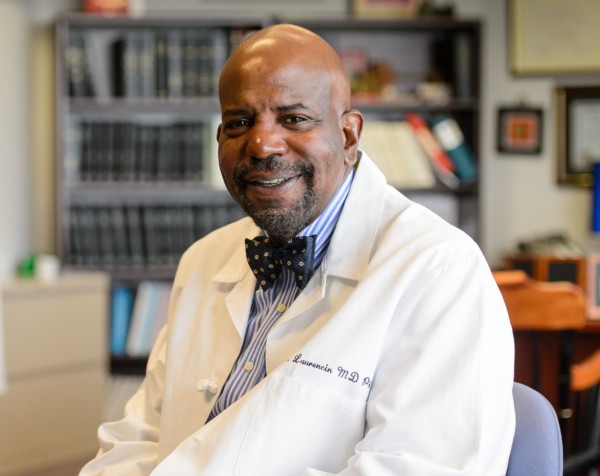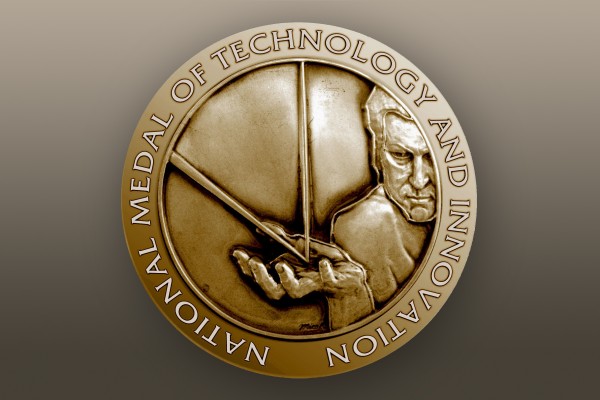Laurencin’s International Accolades and Research Objectives Grow, Earns National Medal of Technology and Innovation
/In mid-2011, it was announced that after three years at the helm, Dr. Cato T. Laurencin would step down as vice president for health affairs and dean of the University of Connecticut School of Medicine on July 1 of that year. Laurencin, it was said, would continue conducting research, mentoring and providing clinical care. In the four and a half years since, it would seem that stepping down was the best thing that could ever have happened for Laurencin, and UConn.
It was announced last week by the White House that Laurencin will receive the National Medal of Technology and Innovation from President Barack Obama next year. The award is the nation's highest honor for technological achievement that is bestowed by the president on America's leading innovators.
 The news came just weeks after it was announced that Laurencin is the recipient of the 2016 Founders Award, the highest honor of The Society For Biomaterials. He will be honored at the 2016 World Biomaterials Congress in Montreal, Canada on May 18, 2016.
The news came just weeks after it was announced that Laurencin is the recipient of the 2016 Founders Award, the highest honor of The Society For Biomaterials. He will be honored at the 2016 World Biomaterials Congress in Montreal, Canada on May 18, 2016.
Laurencin is a world-renowned surgeon-scientist in orthopaedic surgery, engineering, and materials science, and is known as a pioneer of the field of regenerative engineering, UConn said in announcing the award. He has made fundamental contributions in polymeric materials science and engineering, and nanotechnology. His research successes have included the growth and regeneration of bone, ligaments and other musculoskeletal tissues.
In November, UConn announced the launch of a new grand research challenge: regeneration of a human knee within seven years, and an entire limb within 15 years. This major international research undertaking, called The HEAL Project, stands for Hartford Engineering A Limb. It is the brainchild of Cato T. Laurencin, whose laboratory research successes include the growth of bone and knee ligaments.
For the project, Laurencin is teaming with other top tissue engineering, regenerative medicine, and bioengineering experts dedicated to the mission of advancing the fields and developing future therapies for patients living with musculoskeletal defects or who have limb injury or loss. HEAL’s other research investigators include Professors Lakshmi Nair and Yusuf Khan of UConn, Professor David M. Gardiner of UC Irvine, professors at Harvard University, Columbia University, and Sastra University in India.
Earlier this fall, Laurencin was elected a Foreign Fellow of the National Academy of Sciences in India. He is one of only two 2015 Foreign Fellows elected, and the first from the University of Connecticut and UConn Health Center. Laurencin was honored by India’s National Academy of Sciences “for his pioneering work in the field of material sciences.” He was recognized as a world leader in polymer-ceramic composites, and recognized for his contributions in tissue generation and bioengineering.
He was also one of select group of research scientists from around the world to be named this year to be a foreign member of the Chinese Academy of Engineering (CAE), one of the most prestigious academic institutions in China. He was named among a group of foreign members that include five Americans, one Briton, one Canadian and one Austrian, bringing CAE's foreign members to 49.
Laurencin is a professor of chemical and biomolecular engineering; professor of materials science and engineering; and professor of biomedical engineering at UConn. He is also the chief executive officer of the Connecticut Institute for Clinical and Translational Science (CICATS), UConn's cross-university translational science institute.
At UConn Health, he is director of the Institute for Regenerative Engineering; the Albert and Wilda Van Dusen Distinguished Professor of Orthopaedic Surgery; and director of The Raymond and Beverly Sackler Center for Biomedical, Biological, Physical, and Engineering Sciences.
Laurencin previously received the Presidential Faculty Fellow Award from President Bill Clinton for his work bridging engineering and medicine, and the Presidential Award for Excellence in Science, Math, and Engineering Mentoring from President Obama.
“Science and technology are fundamental to solving some of our Nation’s biggest challenges,” President Obama said. “The knowledge produced by these Americans today will carry our country’s legacy of innovation forward and continue to help countless others around the world. Their work is a testament to American ingenuity.” Established by the Stevenson-Wydler Technology Innovation Act of 1980, the medal was first awarded in 1985.
Joel D. Bumgardner, chair of the Awards Committee of The Society For Biomaterials said, “Dr. Cato Laurencin has become a world leader in nanomaterials, and tissue engineering, working across the spectrum from establishing basic science and biomaterial properties to translating discoveries into clinical practice. Also, his work has led to the development of a new area called regenerative engineering. This emerging area builds on and synergizes principles in biomaterials engineering and stem cell/developmental biology to formulate new paradigms for effective repair/regeneration of diseased/damaged tissues.
Bumgardner also noted Laurencin’s mentorship of young faculty and students – “a legacy that will have a significant and long-ranging impact in the broad biomaterials community.”






























